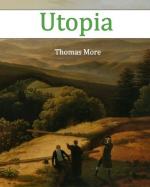|
This section contains 8,853 words (approx. 30 pages at 300 words per page) |

|
SOURCE: "The Utopian Impulse in Seventeenth-Century England," in Between Dream and Nature: Essays on Utopia and Dystopia, edited by Dominic Baker-Smith and C. C. Barfoot, Rodopi, 1987, pp. 20-46.
In the following essay, Thomas discusses the Utopian impulse in literature in relation to millenarianism during the sixteenth and seventeenth centuries.
At the beginning of the seventeenth century the prevailing orthodoxy in England was profoundly anti-utopian. Official religious teaching was that life was necessarily imperfect. Absolute felicity had been enjoyed by Adam and Eve and would be regained by some of their descendants in Heaven. In the meantime man was fallen, nature was harsh and this life could offer only a secondbest.
But the ideal of what constituted perfection was clear enough. Generations of Biblical commentators had built up an accepted picture of Eden as a place of pastoral innocence. Adam and Eve had lived among flowers, fruits and trees...
|
This section contains 8,853 words (approx. 30 pages at 300 words per page) |

|


